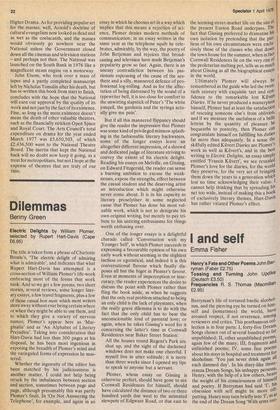Dilemmas
Benny Green
Electric Delights by William Plomer, selected by Rupert Hart-Davis (Cape £6.95) The title is taken from a phrase of Charlotte Bronte's, 'The electric delight of admiring what is admirable', and indicates that what Rupert Hart-Davis has attempted is a cross-section of William Plomer's life-work embracing most of the forms that work took. And so we get a few poems, two short stories, several reviews, some longer literary essays, a few travel fragments, plus a few of those casual bon mots which most writers store away without ever being certain where or when they might be able to use them, and to which they give a variety of nervous names; Plomer's appear here as 'Marginalia' and as 'An Alphabet of Literary Prejudice'. Taking into consideration that Hart-Davis had less than 300 pages at his disposal, he ,has been most ingenious in exposing the breadth of Plomer's mind and the variegated forms of expression he mastered.
Whether the ingenuity of the editor has been matched by his judiciousness is another matter. I could not help being struck by the imbalances between section and section, sometimes between page and page, although presumably this was partly Plomer's fault. In 'On Not Answering the Telephone', for example, and again in an essay in which he chooses art in a way which implies that this means a rejection of science, Plomer denies modern methods of communication; in an essay written in the same year as the telephone squib he celebrates, admirably, by the way, the poetry of John Betjeman and rejoices that broadcasting and television have made Betjeman's popularity grow so fast. Again, there is an uneasy contradiction between his passionate espousing of the cause of the aesthete and a silly, mannered defence of professional log-rolling. And as for the affectation of being distressed by the sound of a typewriter bell, it is too close for comfort to the unwitting slapstick of Pater's The white jonquil, the gardenia and the syringa actually give me pain'.
But if all this mannered flippancy should give the reader the impression that Plomer was some kind of privileged minnow splashing in the fashionable literary backwaters, some of the longer essays leave an altogether different impression, of a shrewd and dedicated judge of literature striving to convey the extent of his electric delight. Reading his essays on Melville, on Gissing, on Edward Fitzgerald, the reader can sense a burning ambition to excuse the weaknesses, expose the strengths, effect between the casual student and the deserving artist an introduction which might otherwise never come about. It is in his capacity as literary proselytiser in some neglected cause that Plomer has done his most valuable work, which is not to denigrate his own original writing, but merely to pay tribute to his untiring enthusiasms for things worth enthusing over.
One of the longer essays is a delightful charade called 'Conversation with my Younger Self', in which Plomer succeeds in expressing a favourable opinion of his own early work without seeming in the slightest tactless or egotistical, and indeed it is this conversational flavour which finally disposes all but the bigot in Plomer's favour. Even at moments of imperception or inaccuracy, the reader experiences the desire to discuss the point with Plomer rather than fling the book aside, as when he suggests that the only real problem attached to being an only child is the lack of playmates, when the really grave dilemma is to do with the fact that the only child has to bear the unconscionable load of parental love; or again, when he takes Gissing's word for it concerning the latter's time at Cornwall Residences near Baker Street Station:
All the houses round Regent's Park are shut up, and the sight of the darkened windows does not make one cheerful. I myself live in utter solitude; it is more than three weeks since I opened my lips to speak to anyone but a servant.
Plomer, whose essay on Gissing is otherwise perfect, should have gone to see Cornwall Residences for himself, should have calculated the distance of two or three hundred yards due west to the animated stewpots of Edgware Road, or due east to
the teeming street-market life on the site of the present Euston Road underpass. The fact that Gissing preferred to dramatise his own isolation by pretending that the par" lieus of his own circumstances were exclty sively those of the classes who shut down the town house for the summer, when in fact, Cornwall Residences lie on the very rim 01 the proletarian melting pot, tells us as much about Gissing as all the biographical essaYs in the world.
Ultimately Plomer will always he remembered as the guide who led the twat' tieth century with exquisite tact and con' fidence to the remarkable lost Kilvert Diaries. If he never produced a masterpiece himself, Plomer had at least the satisfaction of rescuing someone else's from oblivion. and if we measure the usefulness of a belle lettrist by the quantity of pleasure he bequeaths to posterity, then Plomer can congratulate himself on fulfilling his duties far more than adequately. In a sense the skilfully edited Kilvert Diaries are Plomer's work as well as Kilvert's, and in the best writing in Electric Delights, an essay simplY entitled 'Francis Kilvert', we see revealed Plomer's love for the diaries, for the world they preserve, for the very act of bringing them down the years to a generation which
lost no time acknowledging their value. I cannot help thinking that by spreading his net too wide, instead of making this a book of exclusively literary themes, Hart-Davis has rather vitiated Plomer's effect.


































 Previous page
Previous page